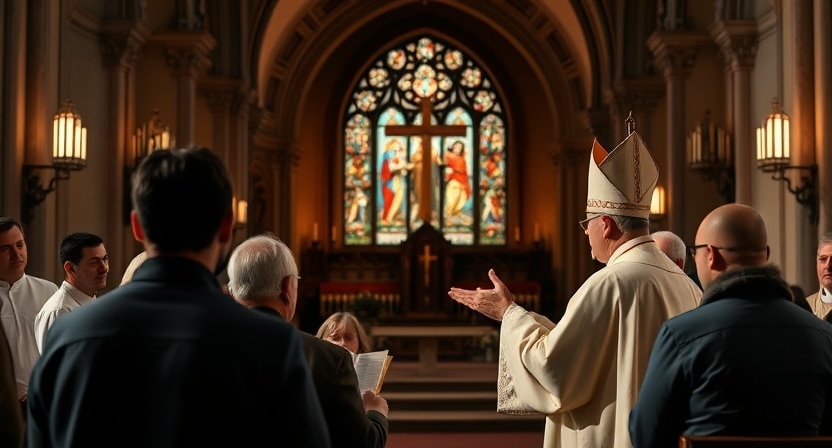THIRTEENTH SUNDAY OF THE YEAR
Hospitality means an open heart
INTRODUCTION AND CONFITEOR
Christ likened the Kingdom of God to a tree in the branches of which all the birds of the sky are able to find shelter. Therefore, in a Christian community there should be no strangers, no outsiders, no rejects. Everybody should feel welcome and at home. Christ accepts us, therefore we should accept one another. Let us pause to see if there is anybody we are rejecting. [Pause]
Lord, you came to heal the wounds of sin and division. Lord, have mercy.
You came to help us to see one another, not as strangers, but as brothers and sisters in God’s family. Christ, have mercy.
You found a place in your heart for the lost, the lonely, and the rejected. Lord, have mercy.
HEADINGS FOR READINGS
First Reading (2 Kings 4:8-11.14-16). This tells how a woman showed great hospitality to the prophet Elisha because she recognizes him as a man of God. It also tells how she was rewarded by God for doing so.
Second Reading (Romans 6:3-4, 8-11). To be baptized means that through the grace and power of the risen Christ we have died to sin and live to holiness.
Gospel (Matthew 10:37-42). The first part insists on the necessity of following Christ even to the point of death. The Second part stresses the virtue of hospitality.
1st Reading – 2 Kings 4:8-11, 14-16A
8 Now it happened that, on a certain day, Elisha passed by Shunem. And there was a great woman there, who took him to eat bread. And since he frequently passed by there, he turned aside to her house, so that he might eat bread.
9 And she said to her husband: “I have noticed that he is a holy man of God, who passes by us frequently.
10 Therefore, let us prepare a small upper room for him, and place a bed in it for him, and a table, and a chair, and a lampstand, so that when he comes to us, he may stay there.”

11 Then it happened that, on a certain day, arriving, he turned aside into the upper room, and he rested there.
14 Later Elisha asked, “Can something be done for her?” His servant Gehazi answered, “Yes! She has no son, and her husband is getting on in years.”
15 Elisha said, “Call her.” When the woman had been called and stood at the door,
16 Elisha promised, “At this time, and at this same hour, with life as a companion, you will have a son in your womb.”
Responsorial Psalm – Psalms 89:2-3, 16-17, 18-19
R. (2a) For ever I will sing the goodness of the Lord.
2 The promises of the LORD I will sing forever,
through all generations my mouth shall proclaim your faithfulness.
3 For you have said, “My kindness is established forever;”
in heaven you have confirmed your faithfulness.
R. For ever I will sing the goodness of the Lord.
16 Blessed the people who know the joyful shout;
in the light of your countenance, O LORD, they walk.
17 At your name they rejoice all the day,
and through your justice they are exalted.
R. For ever I will sing the goodness of the Lord.
18 You are the splendor of their strength,
and by your favor our horn is exalted.
19 For to the LORD belongs our shield,
and the Holy One of Israel, our king.
R. For ever I will sing the goodness of the Lord.
2nd Reading – Romans 6:3-4, 8-11
3 Brothers and sisters: Are you unaware that we who were baptized into Christ Jesus were baptized into his death?
4 We were indeed buried with him through baptism into death, so that, just as Christ was raised from the dead by the glory of the Father, we too might live in newness of life.
8 If, then, we have died with Christ, we believe that we shall also live with him.
9 We know that Christ, raised from the dead, dies no more; death no longer has power over him.
10 As to his death, he died to sin once and for all; as to his life, he lives for God.
11 Consequently, you too must think of yourselves as dead to sin and living for God in Christ Jesus.
Alleluia – 1 Peter 2:9
R. Alleluia, alleluia.
9 You are a chosen race, a royal priesthood, a holy nation;
announce the praises of him who called you out of darkness into his wonderful light.
R. Alleluia, alleluia.
Gospel – Matthew 10:37-42
37 Jesus said to his apostles: “Whoever loves father or mother more than me is not worthy of me, and whoever loves son or daughter more than me is not worthy of me;
38 and whoever does not take up his cross and follow after me is not worthy of me.
39 Whoever finds his life will lose it, and whoever loses his life for my sake will find it.
40 “Whoever receives you receives me, and whoever receives me receives the one who sent me.
41 Whoever receives a prophet because he is a prophet will receive a prophet’s reward, and whoever receives a righteous man because he is a righteous man will receive a righteous man’s reward.
42 And whoever gives only a cup of cold water to one of these little ones to drink because the little one is a disciple amen, I say to you, he will surely not lose his reward.”
HOMILY
One of the nicest things in life is to meet an open, friendly, hospitable person. You can usually tell from the quality of the handshake if you are dealing with such a person. He or she not only makes you feel welcome, but makes you feel that it is good to be you. Hospitality is the hallmark of a true follower of Christ.
At long last the winter was over and spring had come. A warm sun shone brilliantly from a clear blue sky. All along the street the people rejoiced. They drew back their curtains and opened up their windows. Fresh air, sunlight, and warmth poured into their homes bringing gladness to the hearts of all inside. Even the very old felt that it was good to be alive, and exclaimed, ‘Thank Gog for spring! Thank God for the sunshine!’
Just then a beggarman appeared at the end of the street. He was quickly spotted through the open windows. Then, one by one, down the length of the street, the windows were quickly closed, the curtains silently drawn, and the locks put back on the front doors. The old beggarman was a patient man and had plenty of time to spare. He knocked on every door on the street, but not one door opened to him. No one invited him inside to drink a cup of tea. No one even bothered to come out and exchange a friendly word with him. When he reached the end of the street, he turned away and made for the next street to try his luck there.
No sooner had he disappeared than the curtains were pulled back again, and the windows opened up once more. And again the sunshine and fresh air poured in, and all the people rejoiced. Soon the looks were removed from the front doors, and here and there neighbours came out to exchange friendly greetings, for they were a very clannish lot, and prided themselves on this fact.
Strange when you think about it. Our homes are always open to receive God’s sunshine and fresh air, but alas not always open to receive the stranger, especially if he or she comes dressed in shabby clothes. Yet, even in this case, he or she is still a child of that God who lets his sun shine on each one of us, irrespective of whether or not we deserve it.
I’m talking about hospitality. Hospitality is a very different matter from what it was say twenty years or so ago. Those were the days when nobody locked their doors (at least not during the day), and when strangers were few and far and far between. But today the whole scene has changed. There are lots of strangers around, as well as many conmen and thieves. Nobody likes to be taken adventure of. People are fearful of strangers who come around their neighborhood, and not without reason. In some large urban areas you’ll hardly find a house that has not been robbed. And what a horrible experience that is, especially for the elderly and those living alone. Some are never the same as a result of it.
So the old days of open doors are gone, perhaps for ever. Today is the day of locks, bolts, chains, peep holes, alarm systems, dogs, and yes, in some cases, guns. Yet today there is more need than ever for hospitality and friendliness. In the world today there are lots of strangers, aliens, and displaced people. These people have no roots and no friends. They move into neighbourhoods where they know nobody and where lie can be very lonely for them.
We are naturally afraid of strangers, precisely because they are strange, that is, different from us. So what do we do? We put up barriers. We keep them out. It’s not that we take direct action against them. It’s just that we do not invite them into our clubs, and so on.
But Christ calls us to welcome the strangers in our midst. To be hospitable does not mean making them like us. It means accepting them as they are. Then they can shed their strangeness, and become members of the community. Hospitality is not so much a question of keeping the doors of our homes open, as keeping the doors of our hearts open. If you’ve ever had the experience of being lost in a strange place, you will know how frightening it can be. How lovely it is when someone comes up to you and offers to help. It is as if the sun suddenly begins to shine on you from a hitherto dark sky.
If Christians get into ghettos where they secure themselves and their property against those they consider as socially inferior to them, what hope is there for the world? Christ called us to reach out. And the rewards are enormous. He said that even a trivial act of kindness, like giving a cup of cold water, would not go unrewarded. But there are earthly rewards too, and very great ones – the growth of understanding, friendliness, and cooperation, things our neighbourhoods are crying out for.
This is the kind of spring we ourselves can cause to visit our homes and streets, a spring which will banish from our midst the winter of mistrust, fear, and hospitality. For the followers of Christ, hospitality is not an optional extra. It is at the very heart of the Gospel. And the ultimate motivation is clear: to welcome the stranger is to welcome Christ himself.
‘Making contact with God must inevitably lead to making contact with others’. (Catherine de Hueck Doherty).
‘In spite of everything I still believe that people are good at heart.’ (Anne Frank).
PRAYER OF THE FAITHFUL
Hospitality is above all a matter of the heart. Let us pray that we may learn from Christ, who always had an open, warm, and welcoming heart for all who came to him. R. Lord, hear us in your love.
That Christians may given an example to the world by the way they accept the stranger into their midst. [Pause] We pray in faith.
That government leaders may encourage their people to be friendly and welcoming towards foreigners. [Pause] We pray in faith.
For all those who are homeless, for exiles, and for refugees. [Pause] We pray in faith.
That we may try to give each person we meet some small sign of recognition and hospitality. [Pause] We pray in faith.
For local needs.
Let us pray:
Lord, you said that if we welcome another person, even the person of least account in the eyes of society, we welcome you, and to welcome you is to welcome the Father who sent you. May the door of our heart always be open to you who live and reign with the Father and the Holy Spirit, one God, for ever and ever.
SIGN OF PEACE
Lord, it is easy to give a sign of peace here in church, but in the real world it is often very difficult. We pause to see if there is may be one person who at this moment is waiting for a sign of peace from us. [Pause] Lord, help us to give this sign of peace so that we may enjoy the peace and unity of your kingdom where you live for ever and ever.
COMMUNION REFLECTION
So much of our lives are spent
in keeping other people out.
We have private rooms, private houses,
Private clubs, and so on.
Of course there are times
When everybody needs to be alone.
Yet there is a sense in which
Our size as human beings can be measured
by the circles we draw to take other people in.
The smaller the circle, the smaller the person.
A strong person isn’t afraid
of people who are different from himself.
A wise man welcomes them.
By shutting them out he denies himself
the riches of other people’s experience.
He starves his mind, and hardens his heart.
When a wise man names his brothers and sisters,
He draws no circle smaller
than the first one ever drawn on this earth.
In the beginning God gave the earth its shape.
He made it round. He included everybody.
So should we.


